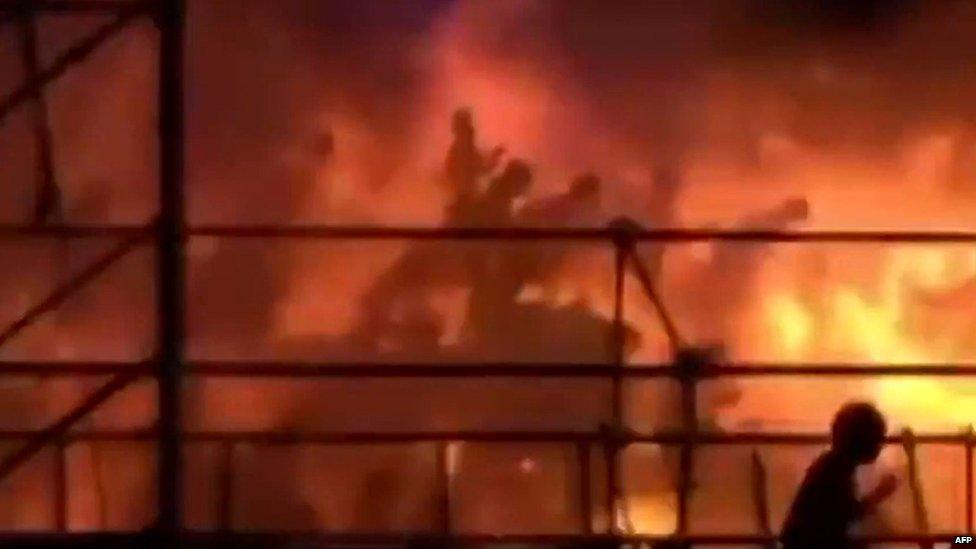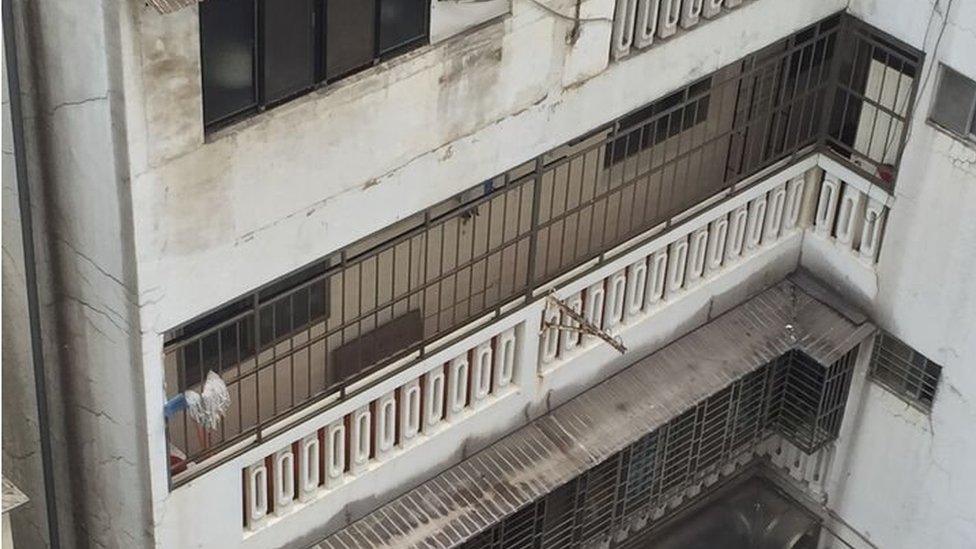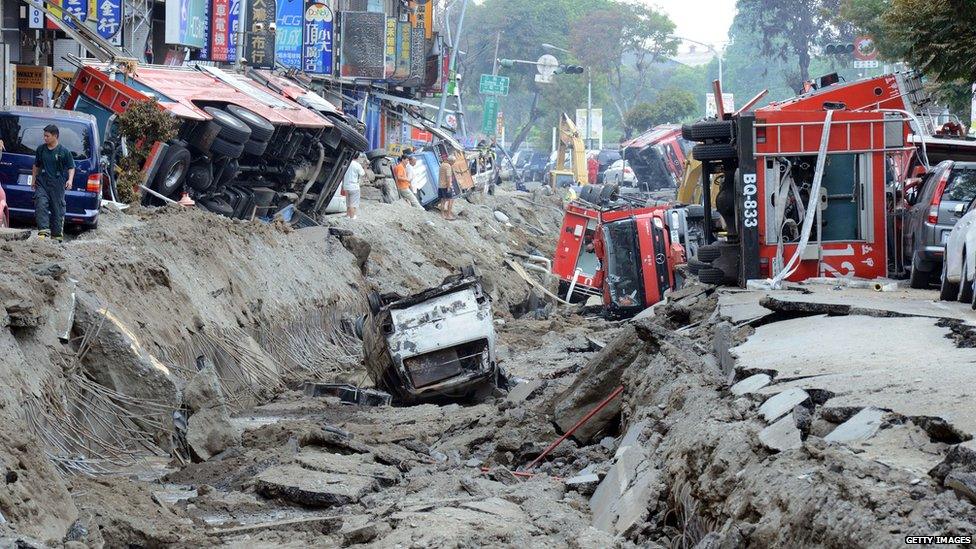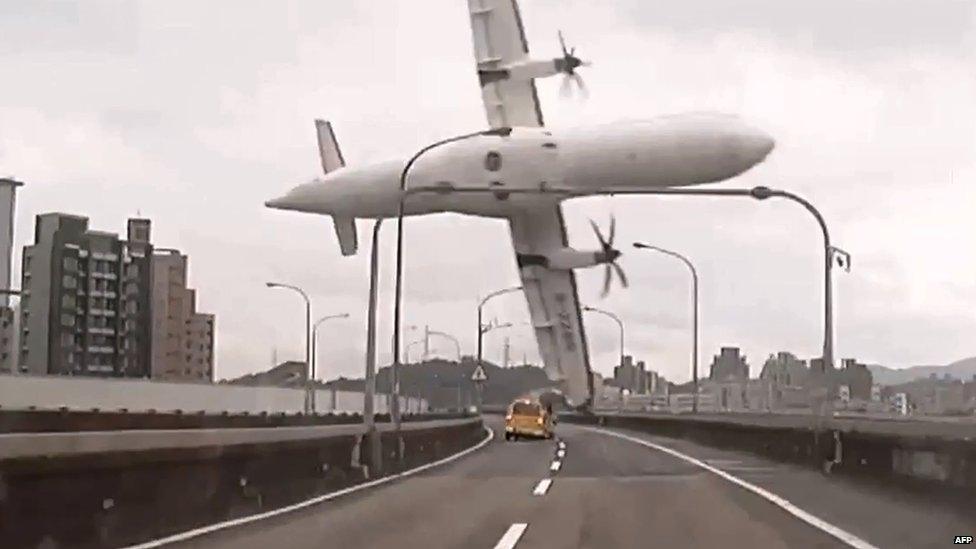Taiwan's year of disasters highlights safety concerns
- Published
Cindy Sui says recent disasters in Taiwan have highlighted the need for a change in the importance Taiwanese place on safety
Taiwan has seen a string of disasters this year. But these are not simply accidents. Behind each case, investigators found that either negligence, an error in judgment or legal violations were at least partly to blame. The BBC's Cindy Sui in Taipei asks whether Taiwan's reputation for safety is deserving.
Taiwan is considered one of the safest places in the world because of its low crime rate. But crime-rate aside, it may not be as safe as it likes to think it is.
The past year of disasters is a stark reminder:
In the past year, two planes from local carrier TransAsia crashed, killing more than 80 people. In one case, the pilot may have misjudged whether it was safe to land after a typhoon. In the other, a pilot is thought to have mistakenly shut down the only working engine on the aircraft.
Underground petrochemical pipelines exploded in Kaohsiung city killing 32 people. Investigators found local and central governments had known about the pipelines, but neglected to inspect them, and neither did the companies that owned or rented them. The local public works department violated regulations in its construction of a draining ditch which contributed to the rupture.
Several fires occurred in structures that were allowed to exist even though they violated building codes. A fire at a bowling alley illegally built with metal sheeting killed six firefighters when the roof collapsed on them.
A fire at a water park concert in June, that began after coloured powder sprayed on spectators ignited, burned nearly 500 mostly young people and killed several. Organisers and park managers had failed to take safety precautions and government agencies had not restricted the use of the flammable material, investigators found.

Most revellers at the water park concert survived but many were badly burnt
The incidents point to underlying problems in how Taiwan views public safety. Employees are not adequately trained on safety, and standard operating procedures are lacking.
And government departments sometimes turn a blind eye to safety problems, even if they recognise them, because they feel they can't do anything or they want to avoid criticism.
Bars on safety in my old flat
This became clear to me after I called a Taipei fire department when I couldn't convince my former landlady to remove some of the metal bars installed over all the windows in my flat.
People regularly die in fires because the bars or cages covering windows prevent them from escaping.

My landlady argued that the next tenant might want them to prevent burglaries.
I was surprised the fire department agreed with me, but said it was up to politicians to ban them. No politicians, however, have done so because they would be criticised by the public.
Ignoring seatbelts
Other examples of blatant disregard for safety include: building managers locking exit doors "to prevent burglaries or illegal entry"; residents being allowed to pile possessions in staircases; hotels and shops allowed to be overbuilt in mountains and riversides leading to collapses during typhoons.
Many people don't wear seatbelts even though they are legally required to and injuries from traffic accidents have skyrocketed.
So laws aimed at protecting public safety are openly and widely ignored, with no consequences for the violators.
Local historian Yang Lian-fu explains it well: "The problem is Taiwan appears to be a modern society, but its people's acceptance of safety precautions has not kept up.
"So even when the government passes laws on safety, people don't abide by them because they think it's inconvenient and civil servants also don't believe they're necessary, so they don't enforce them."

The gas explosion in Kaohsiung ripped up large parts of the road
Sometimes the problem is so widespread the government feels it can't eradicate it.
Even after several deadly fires broke out at illegal extensions built to add value to properties, local governments only dismantled a few; tearing down all of them would mean uprooting residents and upsetting homeowners.
Mr Yang says government departments are also too close to businesses they are supposed to regulate and don't want to disrupt their money-making ventures. So violators, including many illegal hotels, get just a small fine or warning, and are rarely shut down.
'Insufficient awareness'
Taiwan's government spokesman Sun Lih-chyun says it has made a lot of efforts in recent years to boost safety, but admits it faces obstacles.

Two planes from TransAsia have crashed in the past year
"The local governments don't always enforce the laws the way the central government wants them to. It's partly due to insufficient awareness," Mr Sun says.
"Some local politicians also worry they will upset voters and lose votes, but in recent years, we've seen this situation improve. We have also worked to raise public awareness about safety and reduce the number of incidents and deaths," he adds.
Deaths from accidents have indeed steadily dropped, but the past year points to many dangers that still lurk and could cause mass casualties if not dealt with.
After each disaster, change is demanded and for a short time rules enforced.
But many believe that what is really needed is Taiwanese society as a whole placing much greater importance on safety.